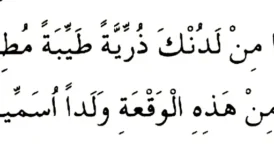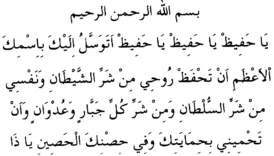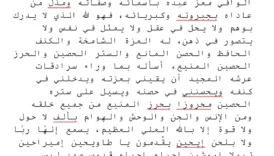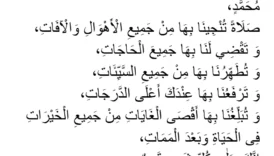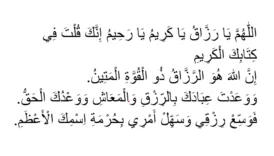The 2 Verses Narrated to Protect the Reciter from Being Killed That Day
Islamic Prayers | This article examines the virtues of the last two verses of Surah At-Tawbah, particularly the narrations suggesting that reciting them protects the person, by Allah’s permission, from dangers and being killed on that day. The Arabic text, transliteration, meaning, and relevant sources are presented.
- The 2 Verses Narrated to Protect the Reciter from Being Killed That Day
- Allah's Protection (Hifdh Ilahi) and Trust (Tawakkul)
- Verses Hoped to Protect the Reciter: Surah At-Tawbah 128-129
- Surah At-Tawbah Verses 128-129
- The Power of Tawakkul and Prayers for Protection
- Final Word
- Bibliography / Sources
Allah’s Protection (Hifdh Ilahi) and Trust (Tawakkul)
Allah Almighty, the sole Owner and Ruler of the universe, possesses infinite mercy towards His servants. He is capable of protecting whichever servant He wills from any danger He wills. In Islamic belief, seeking refuge in Allah’s protection and trusting in Him (tawakkul) are fundamental principles of faith. Our Lord points out the importance of tawakkul in the Holy Quran: “If Allah should aid you, no one can overcome you; but if He should forsake you, who is there that can aid you after Him? And upon Allah let the believers rely.” (Al-Imran, 3/160).
A believer is patient when afflicted with a calamity, grateful when blessed with a bounty, and seeks refuge in Allah in all situations. They know that no harm can touch them and no benefit can be gained without His permission. This submission purifies the believer from worldly fears and anxieties, granting them spiritual strength and peace.
Prophet Muhammad (peace and blessings be upon him) demonstrated complete submission to Allah throughout his life, serving as the best example of tawakkul for us. He never succumbed to despair in the face of difficulties and always trusted in Allah’s help. During the Hijrah journey, when surrounded by polytheists in the Cave of Thawr, his words to Abu Bakr (may Allah be pleased with him) show the pinnacle of his trust: “Do not grieve; indeed Allah is with us.” (At-Tawbah, 9/40).
Allah Almighty has shown various ways for His servants to seek refuge in Him and supplicate. Reading the Holy Quran, making dua (supplication), and engaging in dhikr (remembrance of Allah) are some of these ways. It has been narrated that reciting specific verses and surahs, by Allah’s permission, serves as a means of protection from certain troubles, dangers, and the evil eye.
Verses Hoped to Protect the Reciter: Surah At-Tawbah 128-129
In this context, there are various narrations regarding the virtue of reciting the last two verses of Surah At-Tawbah, verses 128 and 129. Some of these narrations express the hope that whoever recites these verses will not be killed or face serious harm on that day.
One narration on this topic, attributed to the Prophet Muhammad (peace and blessings be upon him) through Abu Ad-Darda (may Allah be pleased with him), states: “Whoever says seven times in the morning and evening, ‘Hasbiyallahu la ilaha illa Hu(wa), ‘alayhi tawakkaltu wa Huwa Rabbul-‘arshil-‘azim’ (Allah is sufficient for me. There is no god but Him. In Him I have placed my trust, and He is the Lord of the Mighty Throne), Allah will suffice him for whatever concerns him of the affairs of this world and the Hereafter.” (Abu Dawud, Adab, 100-101; Ibn As-Sunni, ‘Amal al-Yawm wa al-Laylah, No: 71).
Although this hadith does not explicitly mention “not being killed,” it gives the glad tidings that Allah will be “sufficient” (kafi) for the reciter against all worries and troubles related to this world and the hereafter. Allah being sufficient for a servant means He protects that servant from all evil, danger, and calamity, which implicitly includes the danger of being killed.
Some books of Tafsir (Quranic commentary) and Fada’il (virtues) contain more direct narrations suggesting that the reciter of these verses will not be killed that day or die by the strike of iron (weapon). For instance, Imam Al-Qurtubi, in his commentary “Al-Jami’ li Ahkam al-Qur’an,” mentions various views on the virtues of these verses, including references to such narrations (Al-Qurtubi, VIII, 316-317). However, it should be kept in mind that hadith scholars may have different assessments regarding the authenticity (sihhah) of such specific narrations. Nevertheless, the general content of the verses and their established virtues confirmed by authentic hadiths create a strong conviction that reciting them is a means of attracting Allah’s protection.
Surah At-Tawbah Verses 128-129
These blessed verses are:
Verse 128:
لَقَدْ جَٓاءَكُمْ رَسُولٌ مِنْ اَنْفُسِكُمْ عَز۪يزٌۘ عَلَيْهِ مَا عَنِتُّمْ حَر۪يصٌ عَلَيْكُمْ بِالْمُؤْمِن۪ينَ رَؤُ۫فٌ رَح۪يمٌ
Transliteration: Laqad ja’akum rasulun min anfusikum ‘aziz(un), ‘alayhi ma ‘anittum harisun ‘alaykum bil-mu’minina ra’ufun rahim(un).
Meaning: There has certainly come to you a Messenger from among yourselves. Grievous to him is what you suffer; [he is] concerned over you and to the believers is kind and merciful.
Verse 129:
فَاِنْ تَوَلَّوْا فَقُلْ حَسْبِيَ اللّٰهُۘ لَٓا اِلٰهَ اِلَّا هُوَۜ عَلَيْهِ تَوَكَّلْتُ وَهُوَ رَبُّ الْعَرْشِ الْعَظ۪يمِ
Transliteration: Fa in tawallaw faqul hasbiyallah(u), la ilaha illa Hu(wa), ‘alayhi tawakkaltu wa Huwa Rabbul-‘arshil-‘azim(i).
Meaning: But if they turn away, [O Muhammad], say, “Sufficient for me is Allah; there is no deity except Him. On Him I have relied, and He is the Lord of the Great Throne.”
The first verse (128) emphasizes the Prophet Muhammad’s (peace and blessings be upon him) deep concern, compassion, and mercy towards his Ummah (community). It describes how much our hardships grieve him and how intensely he desires our well-being. Reciting this verse increases our love and connection to the Messenger of Allah (PBUH) and strengthens our consciousness of following his Sunnah (way).
The second verse (129) is a complete expression of tawakkul. It declares that even if people turn away from faith, the believer’s refuge is solely Allah, that He is sufficient for them, and that they should rely only upon Him. The phrase “Hasbiyallah” (Allah is sufficient for me) is one of the most concise expressions of Tawhid (Oneness of Allah) and submission. This verse encourages the believer to seek refuge in Allah and trust in His help in the face of all difficulties and threats. No one can overcome the one who relies on Allah, the Lord of the Great Throne.
The Power of Tawakkul and Prayers for Protection
The phrase “Hasbiyallah” in the last verse of Surah At-Tawbah has been a constant remembrance (dhikr) and supplication (dua) on the tongues of many prophets and righteous servants throughout Islamic history. According to a narration, the last words of Prophet Ibrahim (Abraham, peace be upon him) when he was thrown into the fire were “Hasbiyallahu wa ni’mal wakil” (Allah is sufficient for me, and He is the best Disposer of affairs!) (Bukhari, Tafsir, Al-Imran, 13). Due to this submission, Allah made the fire cool and safe for him (Al-Anbiya, 21/69).
Prophet Muhammad (peace and blessings be upon him) also sought refuge in Allah by reciting this verse (Al-Imran, 3/173) during difficult times, such as after the Battle of Uhud. Therefore, regularly reciting the dhikr “Hasbiyallahu la ilaha illa Hu(wa), ‘alayhi tawakkaltu wa Huwa Rabbul-‘arshil-‘azim” increases trust in Allah, brings strength and tranquility (sakinah) to the heart, and attracts His protection.
Besides these verses, there are other supplications and surahs recommended in the Quran and Hadith for seeking protection:
- Ayat al-Kursi (Al-Baqarah, 2/255): It is promised that whoever recites it before sleeping will be under Allah’s protection until morning, and Satan will not approach them (Bukhari, Wakalah, 10).
- Surah Al-Falaq and Surah An-Nas (Al-Mu’awwidhatayn): Recited to seek refuge in Allah from all kinds of evil, magic, envy, and whispers. The Prophet (PBUH) used to seek refuge in Allah by reciting these surahs (Bukhari, Fada’il al-Qur’an, 14; Muslim, Salam, 46).
- Morning and Evening Supplications: Various morning and evening supplications taught in the hadiths protect a person throughout the day and night from various dangers by Allah’s permission. For example, it is narrated that whoever recites “Bismillahil-ladhi la yadurru ma’asmihi shay’un fil-ardi wa la fis-sama’i wa Huwas-Sami’ul-‘Alim” (In the name of Allah, with whose name nothing on earth or in heaven can cause harm, and He is the All-Hearing, the All-Knowing) three times in the morning will not be afflicted by sudden calamity until the evening, and whoever recites it in the evening will not be afflicted until the morning (Abu Dawud, Adab, 101; Tirmidhi, Da’awat, 13).
When reciting these supplications and remembrances, it is essential not just to repeat them with the tongue but to contemplate their meanings, believe firmly in Allah’s power and protection with full faith, and sincerely seek refuge in Him.
Final Word
Our Lord possesses infinite grace and mercy towards His servants. He protects those who seek refuge in Him and does not abandon those who trust in Him. The last two verses of Surah At-Tawbah are blessed verses that both remind us of the Prophet Muhammad’s (peace and blessings be upon him) compassion for his Ummah and teach a lesson of complete submission and trust (tawakkul) in Allah.
There are authentic narrations that reciting these verses, especially the dhikr “Hasbiyallahu la ilaha illa Hu(wa), ‘alayhi tawakkaltu wa Huwa Rabbul-‘arshil-‘azim,” in the morning and evening protects a person from the troubles of this world and the hereafter and that Allah will suffice them. The narrations found in some sources about the reciter being protected from being killed on that day can be considered a reflection of this promise of “Allah being sufficient.” For, who can harm a servant who enters the protection of Allah, the Almighty, the Lord of the Great Throne?
However, it must not be forgotten that the essence lies in believing in Allah, trusting Him, and obeying His commands. The acceptance of supplications and remembrances depends on sincerity and purity of intention (ikhlas). While reciting these verses and other prayers for protection, we should turn to our Lord with complete submission, seek refuge in His protection, and rely on Him in all our affairs.
May my Lord make us among His fortunate servants who truly rely on Him, seek refuge in Him in every situation, and are granted His protection. May He protect us from all kinds of evil, danger, and calamity through the blessings of the verses we recite and the supplications we make. Amin.
Bibliography / Sources
- Bukhari, Muhammad b. Ismail. al-Jami’ al-Sahih. Istanbul: Çağrı Yayınları, 1992.
- Abu Dawud, Sulayman b. Ash’ath al-Sijistani. Sunan Abi Dawud. Istanbul: Çağrı Yayınları, 1992.
- Ibn As-Sunni, Abu Bakr Ahmad b. Muhammad. ‘Amal al-Yawm wa al-Laylah. Beirut: Mu’assasat ar-Risalah, 1986.
- Al-Qurtubi, Abu ‘Abdillah Muhammad b. Ahmad. al-Jami’ li Ahkam al-Qur’an. Beirut: Mu’assasat ar-Risalah, 2006.
- Muslim, Abu al-Husayn Muslim b. Hajjaj. al-Jami’ al-Sahih. Istanbul: Çağrı Yayınları, 1992.
- Tirmidhi, Abu ‘Isa Muhammad b. ‘Isa. al-Jami’ al-Sahih (Sunan al-Tirmidhi). Istanbul: Çağrı Yayınları, 1992.
- Translation of the Meanings of the Quran. Presidency of Religious Affairs Publications (or specify another known English translation source).
